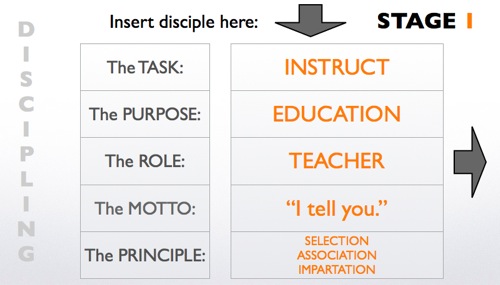Stage One - Instruct
Series | Making Disciples
Each stage in our practical plan of attack includes the Task, the Purpose, the Role, the Motto, and the Principle (as the table below shows). In Stage One we insert a disciple into the very beginning of the process.

To make disciples we start by proclaiming good news, specifically the gospel of Christ as revealed in Scripture. Our first TASK is to instruct and our PURPOSE to educate. Faith comes by hearing and hearing by the word of Christ. Therefore, Christianity requires communicated truth and discipleship depends on properly understanding doctrines of theology rooted in God’s Word.
We received a message from our Lord. Our responsibility is to pass that message on to the another person and the next group and the following generation so that they will do the same. Disciples aren’t made if the baton of truth is dropped anywhere along the way.
The apostle Paul explained that all believers–those who are no longer slaves of sin–have been committed to the standard of teaching. Disciples are delivered into a form of truth, into principles and teaching that mold their lives. Christians are those shaped more by doctrine than by sin.
So our foremost ROLE as disciple-makers is teacher; we explain and defend the truth. Jude called us to contend for the faith once for all delivered to the saints. “The faith” is the objective, fixed body of truth, not personal belief (since it makes no sense to say any particular person’s faith was “once for all delivered to the saints”). Trustworthy servants of Christ and stewards of the mysteries of God love, protect, and pass on the truth.
The core of disciple-making includes teaching [disciples] to observe all that [Jesus] commanded. We can’t be faithful to our commission without knowing and instructing. That’s why our MOTTO is “I tell you.” Paul explained the process in a similar way: what you heard from me in the presence of many witnesses entrust to faithful men who will be able to teach others also.
Jesus modeled this better than anyone. He regularly preached in front of large crowds and instructed His disciples in private. Whether by sermons or conversations, teaching was at the heart of our Lord’s disciple-making plan.
And every Christian can follow His example. The teacher typically knows more than his student. Most of the time the educator is also the elder, that is, they are older. Titus 2 describes a pattern of the older teaching the younger and more maturity brings more responsibility to disciple. But anyone who knows more truth than someone else can and should participate. You can always find someone who knows (at least a little) less than you do. Just because you’re learning from someone doesn’t mean you can’t also be passing that on to someone else.
This Stage incorporates a few PRINCIPLES from The Master Plan of Evangelism such as Selection (of faithful men just as Jesus chose His disciples), Association (being with people just as Jesus appointed disciples to be with Him), and Impartation (giving what has been received to others).
Disciples never move beyond the need for instruction. Though Stage One could be done independent of the others (resulting in delayed growth and therefore a defective plan), the other stages depend on teaching for effectiveness.